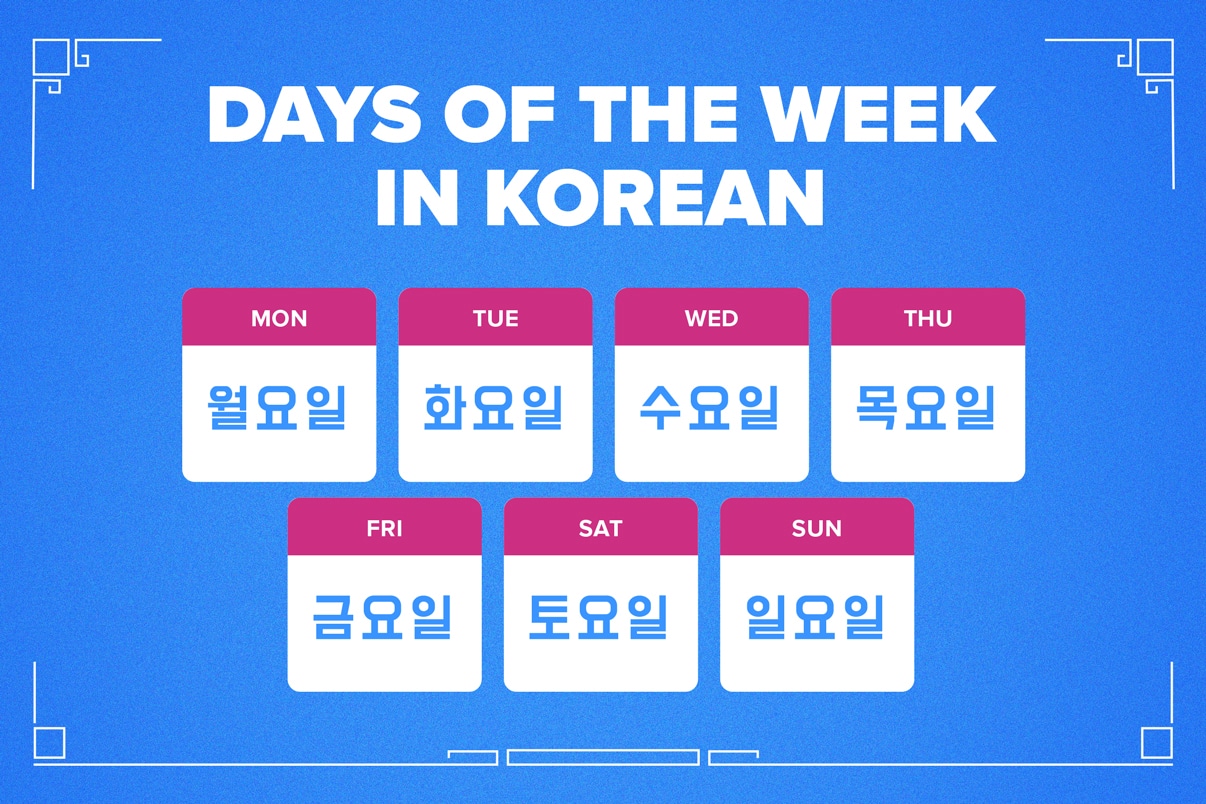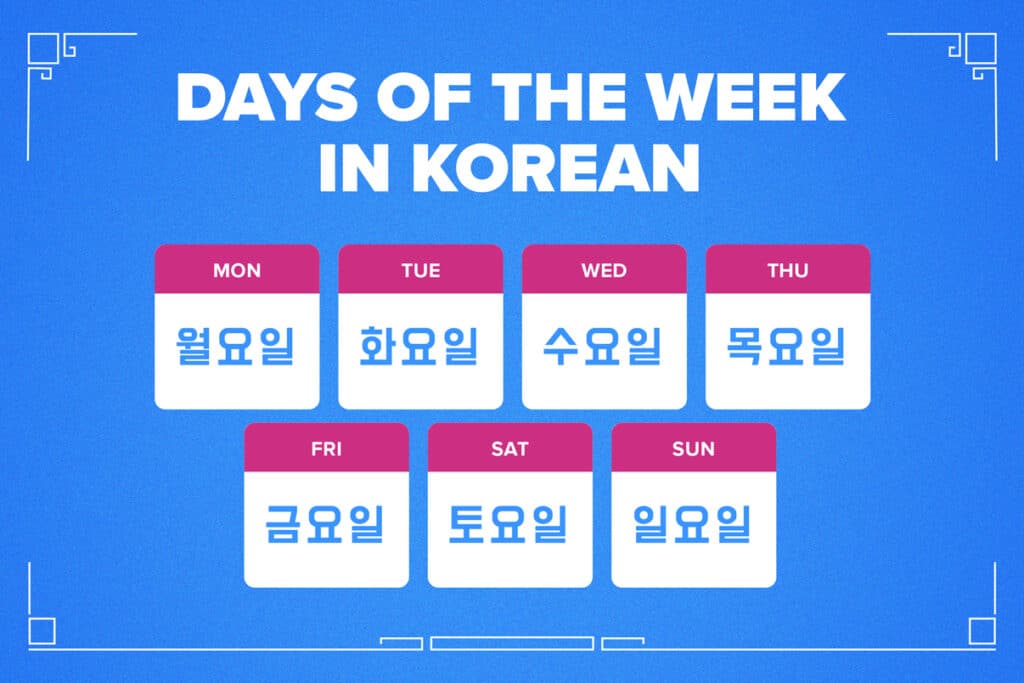
[ad_1]

Sooner or later, the phrases “immediately,” “tomorrow” and “yesterday” gained’t be sufficient.
To confidently communicate about occasions and time in Korean, you’ll must study the Korean days of the week!
Right here’s a easy information in regards to the week-related vocabulary you need to grasp ASAP.
Contents
Obtain:
This weblog put up is obtainable as a handy and moveable PDF that you just
can take anyplace.
Click on right here to get a replica. (Obtain)
The Korean Days of the Week
First issues first: the phrase for “day of the week” is 요일 (yo-il). A prefix is then connected to it, relying on the day in query.
In Korean, the names of the times of the week are based mostly on pure parts. They had been derived from Chinese language characters. In actual fact, Korea’s conventional lunisolar calendar (now usually substituted with the Gregorian calendar) is actually the identical because the unique Chinese language calendar.
Apparently, using parts within the naming of weekdays is one thing seen all through cultures and languages—for instance, the English “Monday,” Spanish lunes and German Montag all had been initially named after every respective language’s phrase for moon.
월요일 (wol-yo-il) – Monday
월 means “moon,” so Monday in Korean additionally means “moon day”! This makes it fairly simple to recollect the factor in query.
Keep in mind to pronounce 월 rigorously. Since a double vowel Hangul character is concerned, it might be a bit troublesome to articulate in case you’re not so used to Korean pronunciation but. Fortunately, the best way you vocalize it will probably provide help to out—your mouth will tackle an “O” form, very like a moon itself!
화요일 (hwa-yo-il) – Tuesday
화 means “hearth,” so Tuesday is “hearth day.” Whereas there’s nothing intrinsically fiery about it, you’ll be able to keep in mind the phrase for Tuesday with a little bit visible mnemonic: a vivid orange hearth can “devour” or dispel the darkness of a moonlit night time.
수요일 (soo-yo-il) – Wednesday
수 stands for “water,” making Wednesday “water day.”
There are a selection of how you’ll be able to keep in mind this. Following my little mnemonic tip for 화요일 (Tuesday), you can too assume: water can “devour” (overwhelm) hearth.
One other simple recall tip is that each water and Wednesday begin with the letter “W.”
Maybe you can too think about that the movement of hump day, unpredictably being both very stagnant or fairly hectic, resembles the mercurial nature of water being both nonetheless and placid or fast and chaotic. Talking of “mercurial,” do you know that Wednesday is in truth thought of associated to the Roman God (and planet) Mercury?
목요일 (mok-yo-il) – Thursday
목 is “wooden,” so Thursday is “wooden day.”
We will proceed my elemental mnemonic to say that wooden can “devour” (take in) water. So, the order from Monday to Thursday goes: moon, hearth, water, wooden.
금요일 (geum-yo-il) – Friday
금 means “gold,” making Friday generally known as the very becoming “gold day.”
You most likely don’t want any assist remembering this one! It looks like we will all agree throughout cultures that Friday is actually probably the most treasured of the week.
토요일 (toh-yo-il) – Saturday
토 stands for “earth” or “soil,” so Saturday is “earth day.”
A trick that may provide help to keep in mind the prefix is by mangling the pronunciation of Saturday a bit to Sat-earth-day.
One other pronunciation trick is that 토요일 sounds a bit like “toil,” as in “toil within the soil”!
일요일 (il-yo-il) – Sunday
As luck would have it, the prefix 일 stands for “solar” or “day,” so Sunday is “solar day”! This makes all of it the better to recollect, apart from the truth that 일 is repeated twice.
We will convey again the fundamental mnemonic, to do not forget that the day’s solar (of 일요일) will ultimately be “consumed” or adopted by the night time’s moon (of 월요일, Monday). So now we will use the mnemonic to recollect Sunday to Thursday!
Korean Vocabulary Associated to the Days of the Week
Alongside the times of the week, you also needs to know different primary vocabulary associated to time-telling:
- 날짜 (nal-jja) – date
- 매일 (meh-il) – every day
- 오늘 (o-neul) – immediately
- 내일 (neh-il) – tomorrow
- 모레 (mo-reh) – day after tomorrow
- 어제 (uh-jeh) – yesterday
- 그저께 (geu-juh-kkeh) – day earlier than yesterday
- 아침 (ah-chim) – morning
- 오후 (o-hu) – afternoon
- 저녁 (juh-nyuk) – night
- 밤 (bahm) – night time
- 주 (ju) – week
- 주말 (ju-mahl) – weekend
- 평일 (pyung-il) – weekday
- 월 (wol) – month
The Korean Date Format
Koreans write their dates within the YMD format: 12 months, month, day.
All numbers concerned within the date (save for the quantity used for the month) are written with Sino-Korean numbers. Should you aren’t but accustomed to your Korean quantity techniques, then it’s finest you begin studying them pronto!
Within the following examples, the textual content in daring are the Sino-Korean numbers of the 12 months, month and day, respectively.
Frequent Korean Phrases Associated to Dates
Final, however not least, listed here are a number of the most typical phrases you’ll hear associated to telling the date.
That’s the fast breakdown of what it’s good to know in regards to the Korean day-to-day (actually).
Now you need to be rather more fluent in monitoring down the week and speaking dates in Korean!
[ad_2]